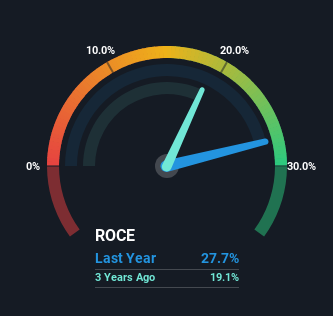- United States
- /
- Trade Distributors
- /
- NYSE:MSM
Here's What To Make Of MSC Industrial Direct's (NYSE:MSM) Decelerating Rates Of Return

What are the early trends we should look for to identify a stock that could multiply in value over the long term? Amongst other things, we'll want to see two things; firstly, a growing return on capital employed (ROCE) and secondly, an expansion in the company's amount of capital employed. Ultimately, this demonstrates that it's a business that is reinvesting profits at increasing rates of return. So while MSC Industrial Direct (NYSE:MSM) has a high ROCE right now, lets see what we can decipher from how returns are changing.
What Is Return On Capital Employed (ROCE)?
For those who don't know, ROCE is a measure of a company's yearly pre-tax profit (its return), relative to the capital employed in the business. The formula for this calculation on MSC Industrial Direct is:
Return on Capital Employed = Earnings Before Interest and Tax (EBIT) ÷ (Total Assets - Current Liabilities)
0.28 = US$510m ÷ (US$2.5b - US$683m) (Based on the trailing twelve months to June 2023).
Thus, MSC Industrial Direct has an ROCE of 28%. In absolute terms that's a great return and it's even better than the Trade Distributors industry average of 13%.
Check out our latest analysis for MSC Industrial Direct

Above you can see how the current ROCE for MSC Industrial Direct compares to its prior returns on capital, but there's only so much you can tell from the past. If you'd like, you can check out the forecasts from the analysts covering MSC Industrial Direct here for free.
What Does the ROCE Trend For MSC Industrial Direct Tell Us?
There hasn't been much to report for MSC Industrial Direct's returns and its level of capital employed because both metrics have been steady for the past five years. This tells us the company isn't reinvesting in itself, so it's plausible that it's past the growth phase. So it may not be a multi-bagger in the making, but given the decent 28% return on capital, it'd be difficult to find fault with the business's current operations. This probably explains why MSC Industrial Direct is paying out 50% of its income to shareholders in the form of dividends. Unless businesses have highly compelling growth opportunities, they'll typically return some money to shareholders.
The Bottom Line
While MSC Industrial Direct has impressive profitability from its capital, it isn't increasing that amount of capital. Although the market must be expecting these trends to improve because the stock has gained 57% over the last five years. Ultimately, if the underlying trends persist, we wouldn't hold our breath on it being a multi-bagger going forward.
While MSC Industrial Direct doesn't shine too bright in this respect, it's still worth seeing if the company is trading at attractive prices. You can find that out with our FREE intrinsic value estimation on our platform.
High returns are a key ingredient to strong performance, so check out our free list ofstocks earning high returns on equity with solid balance sheets.
New: Manage All Your Stock Portfolios in One Place
We've created the ultimate portfolio companion for stock investors, and it's free.
• Connect an unlimited number of Portfolios and see your total in one currency
• Be alerted to new Warning Signs or Risks via email or mobile
• Track the Fair Value of your stocks
Have feedback on this article? Concerned about the content? Get in touch with us directly. Alternatively, email editorial-team (at) simplywallst.com.
This article by Simply Wall St is general in nature. We provide commentary based on historical data and analyst forecasts only using an unbiased methodology and our articles are not intended to be financial advice. It does not constitute a recommendation to buy or sell any stock, and does not take account of your objectives, or your financial situation. We aim to bring you long-term focused analysis driven by fundamental data. Note that our analysis may not factor in the latest price-sensitive company announcements or qualitative material. Simply Wall St has no position in any stocks mentioned.
About NYSE:MSM
MSC Industrial Direct
Engages in the distribution of metalworking and maintenance, repair, and operations (MRO) products and services in the United States, Canada, Mexico, the United Kingdom, and internationally.
Flawless balance sheet established dividend payer.
Similar Companies
Market Insights
Community Narratives


